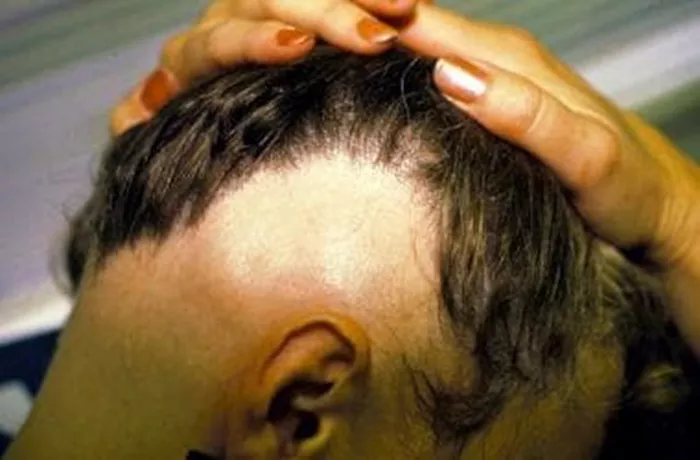Alopecia areata is an autoimmune condition that leads to unpredictable hair loss, often in small, round patches on the scalp or other parts of the body. For those affected, the emotional and psychological impact can be significant, leading many to wonder: Can alopecia areata be reversed? The answer isn’t straightforward, as the condition varies greatly from person to person. However, with the right understanding, treatment approaches, and lifestyle adjustments, many individuals experience regrowth and long-term remission.
Understanding Alopecia Areata
Alopecia areata occurs when the immune system mistakenly attacks hair follicles, causing hair to fall out. Unlike typical hair loss conditions such as male or female pattern baldness, alopecia areata is not linked to hormones or aging but rather to an autoimmune response. The exact cause remains unclear, though genetics, environmental triggers, and stress are believed to play a role.
The condition can manifest in different forms:
- Patchy alopecia areata: The most common type, characterized by one or more coin-sized bald patches.
- Alopecia totalis: Complete loss of hair on the scalp.
- Alopecia universalis: Total loss of hair on the scalp and body, including eyebrows, eyelashes, and body hair.
Some people experience spontaneous regrowth without treatment, while others may struggle with persistent or recurring hair loss. The unpredictable nature of the condition makes it challenging to predict outcomes, but medical interventions and lifestyle changes can improve the chances of reversal.
Medical Treatments for Hair Regrowth
While there is no definitive cure for alopecia areata, several treatments have shown effectiveness in stimulating hair regrowth. The choice of treatment depends on the severity of the condition, age, and individual response.
Corticosteroids
Corticosteroids are the most common treatment, working by suppressing the immune system’s attack on hair follicles. They can be administered in different forms:
- Topical corticosteroids: Creams, ointments, or foams applied directly to bald patches.
- Intralesional steroid injections: Injections into the scalp every few weeks to stimulate regrowth.
- Oral corticosteroids: Used in severe cases but may have significant side effects with long-term use.
Minoxidil (Rogaine)
Minoxidil is an over-the-counter topical treatment that promotes hair growth by prolonging the anagen (growth) phase of hair follicles. While not specifically designed for alopecia areata, it can be used alongside other treatments to enhance results.
Immunotherapy
For extensive or resistant cases, dermatologists may recommend immunotherapy, which involves applying chemicals like diphencyprone (DPCP) or squaric acid dibutyl ester (SADBE) to the scalp to provoke an allergic reaction. This reaction can distract the immune system from attacking hair follicles, leading to regrowth in some patients.
JAK Inhibitors
A newer class of drugs, Janus kinase (JAK) inhibitors like tofacitinib and ruxolitinib, have shown promise in clinical trials. These medications work by blocking immune pathways involved in the autoimmune attack on hair follicles. While not yet universally approved for alopecia areata, they represent a significant advancement in treatment.
Natural and Alternative Approaches
In addition to medical treatments, some individuals explore natural remedies and lifestyle changes to support hair regrowth. While scientific evidence varies, these approaches may complement conventional therapies.
Diet and Nutrition
A well-balanced diet rich in vitamins and minerals is essential for hair health. Key nutrients include:
- Iron: Deficiency can contribute to hair loss.
- Zinc: Supports hair follicle recovery.
- Vitamin D: Low levels are linked to autoimmune conditions.
- Omega-3 fatty acids: Reduce inflammation.
Stress Management
Since stress can trigger or worsen alopecia areata, techniques like meditation, yoga, and deep breathing exercises may help manage flare-ups. Some patients report improvements when incorporating stress-reduction practices into their daily routine.
Essential Oils and Herbal Remedies
Some studies suggest that essential oils like rosemary oil may promote hair growth by improving circulation. However, results are mixed, and these should be used cautiously to avoid irritation.
The Psychological Impact and Coping Strategies
Living with alopecia areata can be emotionally taxing. Hair loss affects self-esteem, body image, and social interactions. Seeking support from therapists, support groups, or online communities can provide emotional relief. Some individuals choose to embrace their appearance with wigs, scarves, or bold hairstyles, while others focus on medical treatments for regrowth.
Can Alopecia Areata Be Fully Reversed?
The possibility of reversal depends on several factors, including the extent of hair loss, individual immune response, and treatment adherence. Many people experience partial or complete regrowth, especially with early intervention. However, relapses can occur, making ongoing management important.
For those with severe forms like alopecia universalis, complete reversal may be less likely, but emerging treatments like JAK inhibitors offer hope. Research continues to advance, and future therapies may provide more definitive solutions.
Conclusion
Alopecia areata is a complex condition with no one-size-fits-all solution. While reversal is possible for many, it requires patience, persistence, and a combination of medical and lifestyle approaches. Consulting a dermatologist specializing in hair disorders is crucial for personalized treatment plans. With the right strategies, individuals with alopecia areata can achieve regrowth and regain confidence in their appearance.
Related Topics:
- Which Month Does Hair Fall Out the Most?
- What Is Involved in Understanding Hair Loss and How Can…
- What Is the Connection Between Greasy Hair and Hair Loss?


